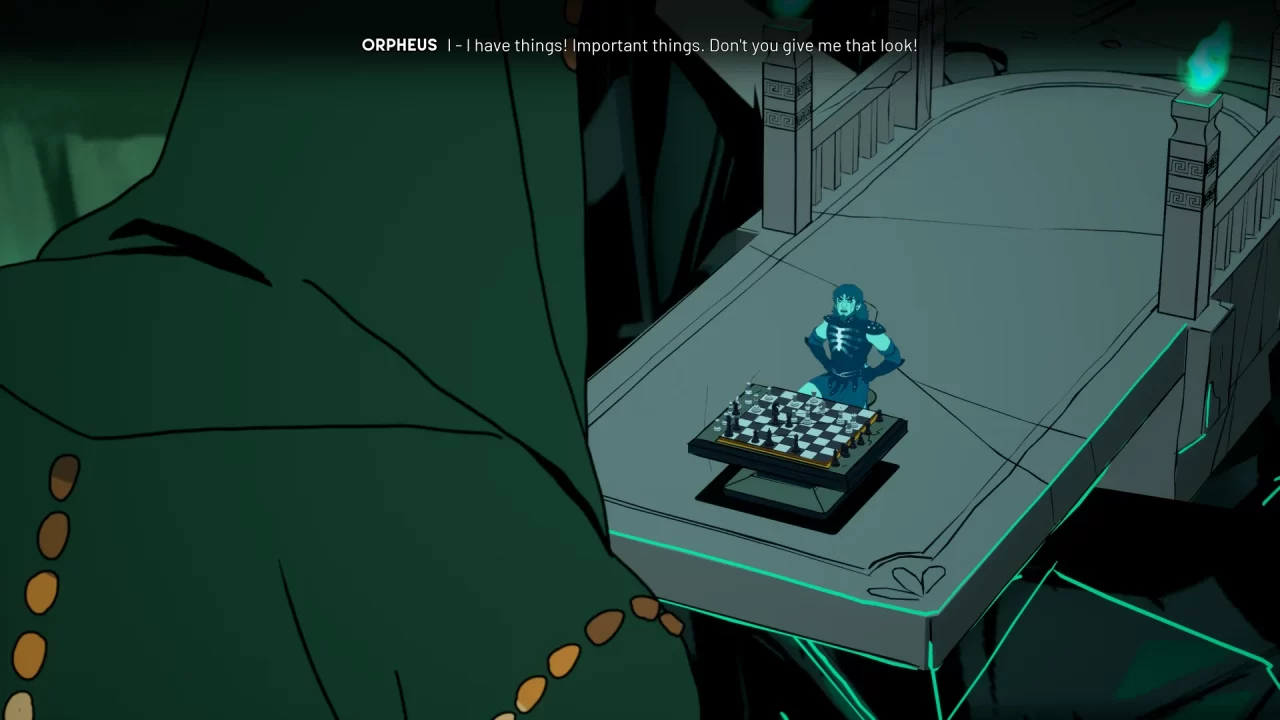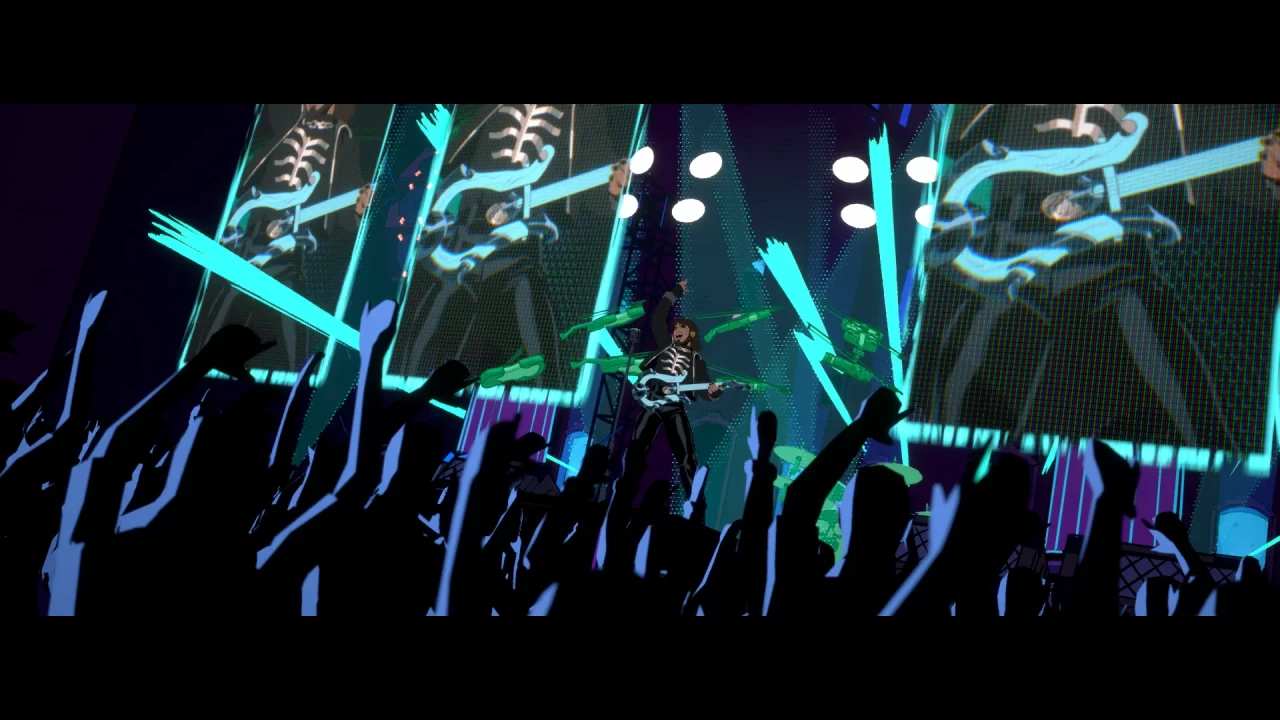When the lights go out after the show, what do you do when you get an unexpected encore? Stray Gods: Orpheus, a DLC follow-up to Stray Gods: The Roleplaying Musical, invites you to step into the shoes of the long-suffering Orpheus after the main game’s conclusion. Orpheus, idling during his eternity in the underworld, is surprised by a visit from Hermes, the messenger of the gods, which disrupts his routine. Now, with the chance to return to the mortal world, will Orpheus embark on a new quest? Or will his tale remain as utterly tragic and unfulfilled as the myth that preceded it? Familiarity with Orpheus and the base game makes this journey even more engaging.
Stray Gods left a lasting impression on me, with its intriguing narrative of Grace’s journey to uncover the murderer of her Muse predecessor set against the backdrop of a pantheon of Greek deities and mythic figures hiding amongst present-day mortals. The BioWare-esque dialogue choice wheels and musical ‘battles’ add an enjoyable interactive element. Stray Gods: Orpheus, a continuation of this narrative, offers more of the same, albeit in a condensed form, inviting you to delve deeper into the story you’ve come to love.
You must have played the base game to get the full experience of the Orpheus DLC. This segment expects familiarity with the characters and setting, spoiling specific plot threads from the original story. When beginning the DLC, you can either carry over save data from a base game playthrough, tailoring certain scenes to reflect your choices, or you can start the DLC using default choices determined by the developer if no save data exists. Unfortunately, the latter option proved vital, as I had somehow lost my save data from my previous Stray Gods playthrough. That said, despite the option to play with defaults, you should play the DLC only after having played the original Stray Gods because of its postgame timeframe.
Since you need to be familiar with the base game for this DLC, there isn’t much in terms of unfamiliar gameplay, which is good because the DLC wastes no time explaining the setup. You choose dialogue options for Orpheus from a dialogue wheel to advance the story, with six new interactive musical numbers to engage in. Depending on the color-coded personality flavorings of your timed musical choices, a song’s lyrics and overall tone/feel will change. This DLC keeps it simple by using the same format as the base game.
Visually, Stray Gods: Orpheus is a treat for the eyes. The stop-motion animated comic imagery to present the story continues to be quite eye-catching. The graphics are vibrant and engaging, even when depicting the bleak atmosphere of the underworld. The blend of modern aesthetics with visual hints of the ancient world the myths originate from is fascinating, and the ‘animated’ musical numbers are a sight to behold, further immersing you in the game’s world.
Stray Gods: Orpheus is an interesting epilogue to the original game in that its narrative centers more around Stray Gods‘ side characters than its power players. You find mentions of Persephone or Apollo here, but you only get to catch up with them through what other characters say. Even Orpheus was just a bit player in the base game, perhaps best known for his contribution to the solid musical number “The Throne.” Charon is a surprising delight in his DLC scenes, and Hermes continues shining brightly in their expressive scenes as they build a friendly rapport with Orpheus to help him out. Sensitive Eros even shares a surprising duet with Orpheus that puts a different spin on the bard’s famous and tragic romance with Eurydice. I give the DLC credit for opting to explore in greater detail these more minor but very much fan-favorite characters, as it showcases that they’re highly memorable despite having limited scenes in the base game.
Sound-wise, I can’t complain about the evident care put into Stray Gods: Orpheus’ soundscape. The sound effects are on point and the voice acting is phenomenal. A huge kudos goes to the vibrant performance of Anthony Rapp as Orpheus, perhaps best known at the moment for his role in Star Trek: Discovery and musical theater. Abubakar Salim reprises his gentle voice work as Eros and shows considerable singing chops. Erika Ishii once more captures Hermes’ cheerful and encouraging personality. The six new songs added to the DLC are amongst the best of the game’s musical numbers. I enjoyed the songs in Orpheus’ story more overall. There are quite a few standout songs in the main game’s repertoire, but the entire selection of musical entries in the DLC is objectively stronger to me. “What’s Next (Red)” and “The Meaning of Love (Green)” are just two examples of how impressive the musical numbers in the DLC are.
Truthfully, there isn’t much I can criticize Stray Gods: Orpheus for. As a follow-up side story epilogue to Stray Gods: The Roleplaying Musical, it explores a more personal tale set in its fascinating urban fantasy world. It’s not strong enough to justify buying on its own, especially as it prioritizes familiarity with the base game. Still, those planning on playing through Grace’s adventure or who have done so already will find more to enjoy here. It’s undoubtedly more condensed and brief at roughly two hours per playthrough, but the DLC still manages to tell a complete, satisfying story.
Stray Gods: The Roleplaying Musical is a creative, choice-heavy game focusing on interactive music at the root of a murder mystery involving ancient myths in the modern day. Stray Gods: Orpheus is a genuinely compelling DLC addition to that mythos centered around one person’s quest for self-discovery long after they thought their story was over. Ultimately, I love the hopeful possibility inherent in the plot as this DLC proves to be a welcome return to an enjoyable game.





